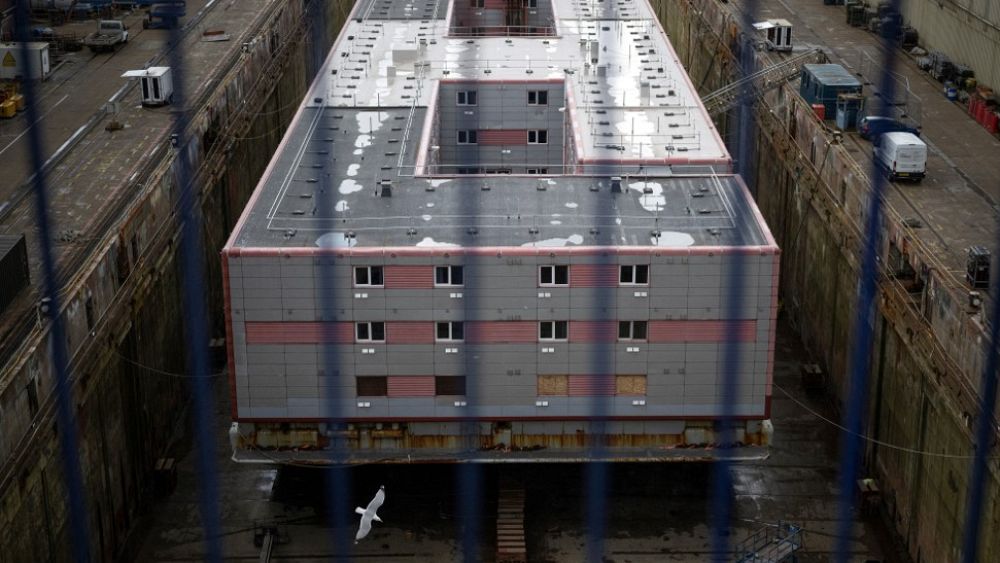The chequered past of Europe’s ‘floating prison’

Death, bomb threats and crime have blighted Bibby Stockholm’s 47 years on the waves.
The Bibby Stockholm has hit the headlines a lot in recent months.
Attention is focused on the UK government’s plan to house asylum seekers on the massive barge, which it hopes to begin on Monday.
The Conservatives claim it offers cost-effective accommodation, amid a record backlog of asylum cases. However, the move has widely been condemned as dangerous, inhumane and not cost-saving.
Yet this is just the latest chapter in Bibby’s chequered history.
It has been variously used across Europe to house rough sleepers, as a floating detention centre and was even the subject of a bomb threat.
Built in 1976 by the Dutch company Nederlandse Scheepsbouw, the ship was converted into an accommodation barge in 1992.
Current owners Bibby Lane – which has “well-evidenced historic ties” to the slave trade, according to the UK Refugee Council – say it can accommodate more than 500 people in “luxury”, but it was originally fitted out to house just 222.
Fears about overcrowding led Britain’s Fire Brigades Union to warn the 47-year-old barge would be a “potential deathtrap” for any asylum seekers housed there.
During the late 1990s, Bibby provided 52 overnight beds for the homeless in Hamburg, Germany.
German authorities resorted to the ship as an emergency measure to ensure that during “winter no one has to sleep the street”, then Hamburg’s Senator for Social Affairs, Helgrit Fischer-Menzel said at the time.
ID checks, crime and the size of the rooms kept many rough sleepers away from the barge, reported the left-wing German news outlet Taz in 1994.
It noted only 65% of the beds were used, with the homeless steering clear of the barge.
Next the gigantic 90m long, 27m-wide ship was used to detain asylum seekers in Rotterdam in 2005.
A Dutch watchdog called Bibby an “oppressive environment”, though it has reportedly been refurbished since then.
In February 2008 an Algerian asylum-seeker Rachid Abdelsalam died of heart failure on board.
Fellow detainees claim that although they warned the guards of Rachid’s deteriorating health, his cell door was only opened two hours after he died, the monitoring organisation State Watch reported in 2012.
The vessels-come-prisons were notorious for offering poor quality health care and services, triggering repeated hunger strikes and riots from detainees, State Watch added.
Going undercover as a security guard, Dutch journalist Robert van de Griend documented the abysmal treatment of inmates.
Rotterdam later closed the Bibby and the other detention centres, after new facilities were created.
Construction workers were next to stay in the nearly 11,000-tonne behemoth.
Bibby was used in 2013 by Petrofac to accommodate those working on Scotland’s Shetland Gas Plant in the North Sea.
A disgruntled former offshore worker told emergency services in 2015 that bombs had been planted on the barge along with another accommodation ship berthed in Lerwick harbour in the Shetland Islands.
He was given a six-month tagging order, admitting threatening and abusive behaviour.
The last “floatel” was towed away from Lerwick in 2017, after being unoccupied – save for a single security guard – for more than a year.
The Shetland Times quoted the port authority as saying the ship had brought in welcome revenue to the remote archipelago, though they now wanted to free up berthing space.
Months later it was reported by the Irish Times that discussions were ongoing about using Bibby as floating accommodation for university students in Galway, Ireland.
The plans were soon dropped, however, with the docks deemed unsuitable and concerns over planning permission.
Authorities in the West Ireland city said the student accommodation crisis needed to be tackled in a different way.
In April, the UK government announced its plans to use the barge to house asylum-seekers, as the country grapples with a record backlog of cases.
Plans to start putting people onto the 500-capacity boat in the UK have been repeatedly pushed back, reportedly costing the British taxpayer 3 million in delays.
Still, the UK government insisted on 3 August it will be ready within weeks, despite repeated warnings about the risks of the plan.
Ministers claim Bibby Stockholm will help reduce the €6.5 million bill footed by taxpayers to house asylum seekers in hotels, with existing facilities fill to the brim. That the ship is a more cost-effective alternative is disputed, however.
Critics also point out hotels are only needed as the Conservative government has degraded and underfunded the asylum system, leading to a record backlog of more than 165,000 cases, figures by the Insitute for Government show.
Source: Euro News















